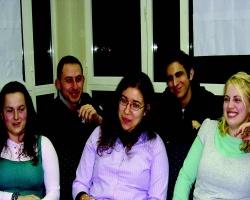Elnura, a former Muslim, lives and works in Kygyzstan. Lena, a young woman who stood on the sidelines and watched her Christian friends for most of her time in college, is now back in Kazakhstan attending a local church. Ramona, a vivacious believer from Romania, is in graduate school in the States. Lulieta, an Albanian from a Muslim background, works for a Christian group, ministering to international students. Anatole, a Moldovan from an unchurched background, is pastor of a small church in Bulgaria.
What’s their connection? All these intelligent and hard-working women were part of our ministry at a small university in Eastern Europe.
A Dark Place
We work with students at an English language-based university in Eastern Europe. Thirty nationalities are represented among the student body of approximately 1,100. The students are bright, and many continue their education at well-known American and European universities.
Although the university itself looks American, the worldview of most students is vastly different from that found in the States. Like Europe in general, the school lies in the midst of a secular society. Students view Christianity and the Bible as irrelevant to their lives. Although this campus is tucked inside an Orthodox country, people’s allegiance to the church is nominal. Protestantism is viewed with suspicion; many consider it a sect, dangerous and to be avoided. Here, campus ministers are a foreign concept.
Working as Insiders
At 45, my husband returned to life as a student to earn first a master’s, then a doctorate so he could be an insider who could influence students for Christ. As a professor, he teaches from a Christian perspective. He may be the only believing teacher his students ever have—perhaps their only exposure to a believer. Although he onlycan touch on spiritual issues in class, he invites his students to his office to talk about their life questions.
His position also makes it more natural to invite students into our home. Another way we’re seeking to make a difference at the school is through an American student. By spending a semester at this university, Tanya is meeting the requirements of her academic program, but that’s not the main reason she came. Studying here and living in a dorm gives her opportunities to make friends and show them Jesus’ love. It’s rare for students here to see a Christian like Tanya close-up. We’re excited to see how God will use her and hope to see other believing students from the States follow the pathway she’s opened.
A Different Approach
Because of the differences in culture and worldview, our weekly student gatherings aren’t like those at many U.S. campuses. Our meetings are small. Attendance has ranged from two to 12 people. We try to make the atmosphere comfortable for anyone who comes, whether they’re atheists, Muslims, nominal Christians or genuine believers. We work to accomplish this through the atmosphere and the content. Students can talk about life issues without fearing someone will judge or force religion on them.
We print our text—a Bible passage or verses on a particular theme—so each person can follow along as we read aloud; not everyone who comes owns a Bible. From there, we ask questions to encourage discussion. Last semester, students discovered they shared some commonalities with a young exile who was willing to stand up for what he believed as we read and talked about Daniel. Last week, we talked about how the fear of God relates to the love of God in response to a student’s questions on the subject. At the end of our time, home-made cookies contribute to an informal atmosphere and further conversation.
We’ve also started something new, thanks to a colleague who passed the idea along to us. Each person is given the opportunity to share a life event with the group. It doesn’t have to be serious or religious. It can be a childhood memory, or something that happened yesterday. The purpose is to get to know each other better, which will tie us together emotionally. Hopefully, such story-telling in time will move from simply relating events to sharing deeper heart issues as we become more comfortable with one another.
Our Goals
We have three goals for the young people we meet with. First, we want to introduce students to Jesus. We provide various contexts in which non-believers can see Christians interacting with each other in love. With some, we read the Bible one-on-one. We may share the gospel in our home or at a café. Perhaps the biggest influence on seekers is time spent in dorm rooms, interacting with the few believing students who live among them.
Our second goal is to equip believing students to follow and serve the Lord. Virtually all the students here are from non-church backgrounds. They may never have read the Bible, and their familiarity with its stories may only come through films. We have to begin building a strong foundation from a very elementary level.
Lastly, we want to train students to become laborers who will live among and minister to the lost for a lifetime. One of my goals for the young women I meet with is to teach them how to study the Bible for themselves. Another key element in this process is connecting them to strong believers who live near them, whether in their home countries or abroad.
Ministry in Eastern Europe is challenging, but God is working, drawing students to Himself and raising up life-long laborers.




